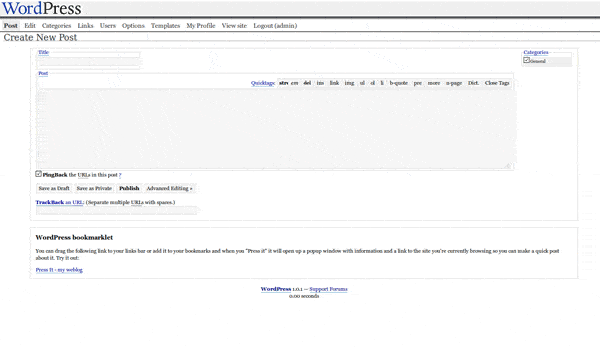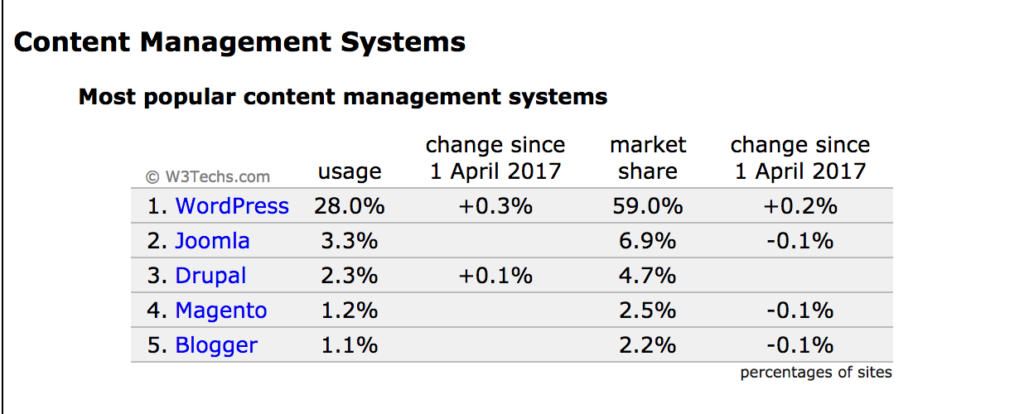Editor’s Note: This post has been updated to celebrate WordPress’ 15th anniversary! 5/27/18
WordPress celebrates its 15th birthday this weekend. The CMS has come a long way since its release in 2003. Not only does it today power more than 30 percent of the web, but its also supported and maintained by a growing community.
WordPress has grown so much – today we want to highlight some of the biggest milestones of the last 15 years.
2003 — WordPress Was Released
Fifteen years ago WordPress officially launched when Matt Mullenweg and Mike Little released a blog post with a download link and a changelog as a fork of b2/cafelog. The pair didn’t want to see a powerful blogging platform die, so they gave it new life.
Now over a decade later, the CMS is a powerful platform that supports sites such as Wired, Beyonce, Disney, Sony, and beyond. WordPress has evolved into so much more than blogging software – it is a platform from which any person or company can launch their digital experiences.
2004 — Ryan Boren Created The Plugin System
One of the biggest reasons WordPress has grown into a powerhouse is because of plugins. With over 50,000 free plugins in the repository, you can add any functionality to your site. If you can imagine it, then there’s probably a WordPress plugin for it.
Ryan Boren’s invention took WordPress from a blogging platform to a CMS that can support enterprise sites.
2004 — GNU License
One of the most beautiful and defining features of the CMS is the fact that it is entirely open source and always will be thanks to the GNU license. The GNU GPL is a free software license that allows anyone to modify, share, and use WordPress for free forever. Because this will never change, users can continue to improve the software.
The reason WordPress has grown so fast is all due to people that volunteer to work on core, security, and more. Without community members catching vulnerabilities and fixing bugs, the CMS wouldn’t be where it is today.
2004 — First Update: Version 1.2 “Mingus” Released
WordPress Version 1.2 was the first major WordPress update, which included the addition of plugin support. WordPress has since seen more than 25 major updates, all of which have been named after jazz artists.
At last year’s State of the Word address, Mullenweg announced the update process will work differently moving forward. Instead of sticking to the three updates a year schedule, WordPress will only get an update if there is something worth updating.
2005 — WordPress Logo Created
Any new organization needs branding, and as WordPress began to grow the community realized it was important to decide on a logo. Six developers got together over a private email group to throw out suggestions.
Early on, community members made special logos for holidays and celebrations. The logo went through many official iterations before landing on the W we know and love today. The logo began to drive WordPress as a real brand, making it is more recognizable.
2006 — First WordCamp
WordCamps have been instrumental in the growth of WordPress. Not only do they afford attendees the opportunity to meet in a face-to-face setting but they are also a great opportunity for WordPress users of all skill levels to learn from one another. The first WordCamp kicked off in 2006 in San Francisco. More than 500 people RSVP’d to the event.
In 2017 alone there were 115 WordCamps in 41 countries and 3,193 meetups in 58 countries. Not only does that speak to the size of the community, it speaks to the global nature of the CMS.
2010 — The Foundation Was Created
As we stated above, open source is the lifeblood of WordPress and something that needs to be protected at all costs. In an effort to keep the CMS open, Automattic registered the trademarks in 2006, but there was disagreement on who had access to what.
Automattic decided to set up a completely separate entity to house the trademarks. That way if the company ever gets acquired, the trademarks will remain untouched.
According to the Foundation mission statement: “People and businesses may come and go, so it is important to ensure that the source code for these projects will survive beyond the current contributor base, that we may create a stable platform for web publishing for generations to come. As part of this mission, the Foundation will be responsible for protecting the WordPress, WordCamp, and related trademarks.”
2010- WordCamp Guidelines Were Created
As the community began to grow, more WordCamps began to crop up. Up until 2010, WordCamps were incredibly informal affairs, but there were many problems. Some conferences didn’t have any budget, organizers ended up paying for things out of pocket, and some people were taking advantage of registration lists.
In May 2010, the Foundation created the position of central WordCamp Liason. With that came the first set of WordCamp guidelines. While some people were upset with how the guidelines were created, everyone agreed more direction was needed. The guidelines evolved over the years with community feedback making them what they are today.
2012 — Themes Added To Dashboard
One of the things that sets WordPress apart from other CMS’s is how customizable it is. With many site making services, you can only choose from a few design styles, but WordPress has access to hundreds of themes to change the look and feel of your site.
Of course, you can completely customize any part of your site, but full-functioning, responsive themes make starting a beautiful looking site easier. Adding the themes directly to the dashboard made site design accessible to beginners and experts alike.
2015 — Plugin Directory Passes One Billion Downloads
As we stated above, plugins allow users to extend and expand the functionality of their sites, and in that way sets WordPress apart from similar software. Even more than that, plugins act as their own business with thousands of developers making a living by creating plugins.
When the repository passed one billion downloads it proved the lasting power of plugins, and in turn, WordPress.
2015 — REST API Infrastructure Merged With Core
The REST API is a game-changer for WordPress, and in October 2015, the infrastructure was added to WordPress 4.4. Although there have been problems merging the rest, it is still a significant moment in WordPress’ history.
The REST API opens up endless possibilities. And although it isn’t fully merged in core yet, there are several examples of companies using it successfully — two most notable being the New York Times and Wired.
2015 — WordPress Powers More Than 25 Percent Of The Internet
On November 8, 2015, WordPress hit an incredible milestone, powering 25 percent of the internet. Since then, the number has risen to 26 percent and continues to grow.
Now, that number is already up to 28 percent.
2015- WordCamp US
The first WordCamp US was held in December 2015 in Philadelphia. The event was a huge success, drawing roughly 2000 attendees from all over the world. The following year WCUS brought in even more people, speakers, and sponsors, making it a powerhouse of WordCamps.
2016- WordCamp Europe
In the same way WordCamp US brought together the US, WC Europe in 2016 brought together an entire continent. Held in Vienna, WCEU brought in 3,000 attendees, making it the biggest WordPress meetup to date.
2017’s conference in Paris, France is on track to be even bigger, proving just how global the CMS has become.
2017- Gutenberg
At the State of the Word in 2016, Matt Mullenweg announced his plans to overhaul the editor. Specifically to introduce a “block-based editor.” Shortly after, the proposed change was given a name, Gutenberg, and the community erupted. The beta was released and met with some controveresy, so the team went to work addressing some of the problems laid out by developers.
Though Gutenberg isn’t merged with Core yet, it is set to be in the next big release. Bugs have been fixed, and kinks have been smoothed, and Gutenberg is set to be the biggest change to the editor in 15 years.
Needless to say, it has been an incredible 15 years for WordPress, and all signs show no indication of it slowing down. We can’t wait to see what the next 14 hold.
Did we miss any of your favorite milestones? Share them in the comments below.








1 Comment